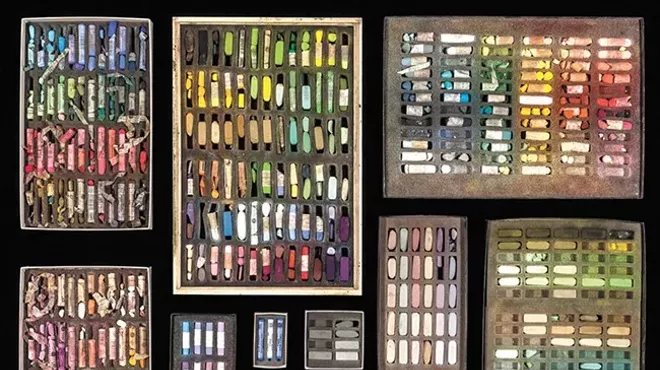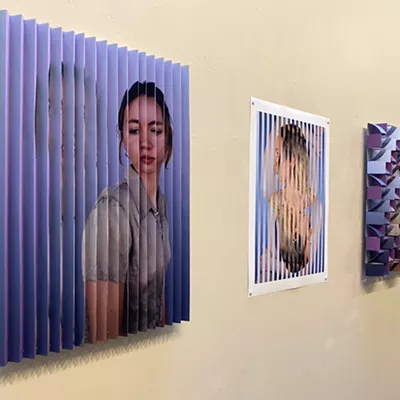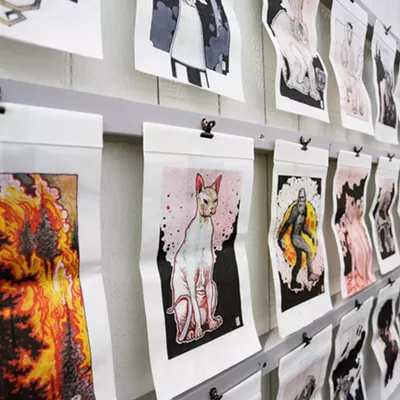The popular saying about Muhammad going to the mountain (because it wouldn't come to him) seemed an ideal story lead for the Northwest Museum of Arts and Culture's upcoming exhibition of United Arab Emirate artwork entitled "Past Forward." Since few Americans can travel to experience Arab culture firsthand, representative artworks are coming here on their way to visit six states over a two-year period.
Yet using that phrase without verifying its authenticity and intent — it may or may not reference the Muhammad, founder of Islam — illustrates the potential chasm in our understanding of Arab culture, including Emiratis, as UAE citizens are called. Reliant on secondhand sources sometimes rife with misinformation, what do we really know of a culture?
Bridging that gulf is part of the intent behind the exhibition, according to the exhibition's Emirati co-curator, Noor Al Suwaidi.
"I feel strongly that cultural programs such as 'Past Forward' bring our two nations closer together. Not only are we sharing stories, but we find more and more common ground. On the flip side, Emirati Artists visiting the U.S. as part of this exhibition take away with them further knowledge about America and are inspired by each city's rich history and art scene," she says.
The MAC plans numerous events, including a family-oriented opening with calligraphy, oud music, falconry and a panel discussion entitled "Celebrating the Past in the Present: Telling Cultural Stories through Art."
Beyond diplomacy and strengthening ties with one of America's few Persian Gulf allies, the exhibition is a rare opportunity to view contemporary Emirati artwork. It features 50 paintings, photographs, sculptures and video installations by 25 artists, spanning several generations and from all seven emirates.
At 25, Afra Bin Dhaher is one of the youngest artists included in the show. In "Prayer Rugs," from her Self-Portrait series, Bin Dhaher photographs herself as if walking, holding a rolled-up prayer rug against the backdrop of a larger rug. While her clothing melds into the elaborate rug pattern, her stance is forward-moving, suggesting she is both connected to and yet distinct from her surroundings.
At 64, Abdul Qader Al Rais is one of the most seasoned artists, old enough to have been making art decades prior to the establishment of the UAE in 1971. His abstracted oil painting, Al Jalbout, depicts the partial structure of a vessel used in pearl diving, an occupation integral to the Gulf region's history. Thekrayat is a confidently detailed scene of rural, rocky Fujairah, home to the oldest mosque in the UAE.
One of two UAE artists who will attend the opening exhibition, Al Rais hails from Dubai, some 7,400 miles from Spokane. There is more than just time and distance to traverse here; the cultural divide is equally challenging, but Al Rais is optimistic. As current events indicate, just the word "Islam" sends some squawking, like Spokane County Prosecutor Larry Haskell's wife Lesley, with her exuberant online denunciation of "Muzlims" earlier this year. Not to be outdone, a handful of Idaho Republican legislators recently axed a child support measure — jeopardizing millions in federal funding — out of unfounded fear about the measure leading to Islamic Sharia law.
Al Rais is optimistic, noting that a trip to the U.S. early in his career helped re-inspire his painting: "Art joins people on opposite sides of the world who may not share the same language, but can connect through a painting."
That makes "Past Forward" especially relevant, as it affords our region an ideal opportunity to discover firsthand the ancient culture of Emiratis, whose country is roughly the size of Maine, with a population exceeding 9 million.
And if art is a mirror to society, the exhibition also demonstrates shared concerns expressed by Emirati artists — how modernization impacts the environment, elements of social change, the search for meaning in an increasingly complex world. They are concerns not so different from our own. ♦
Past Forward: Contemporary Art from the Emirates • May 16-June 28 • The Northwest Museum of Arts and Culture • 2316 W. First • northwestmuseum.org • 456-3931





















